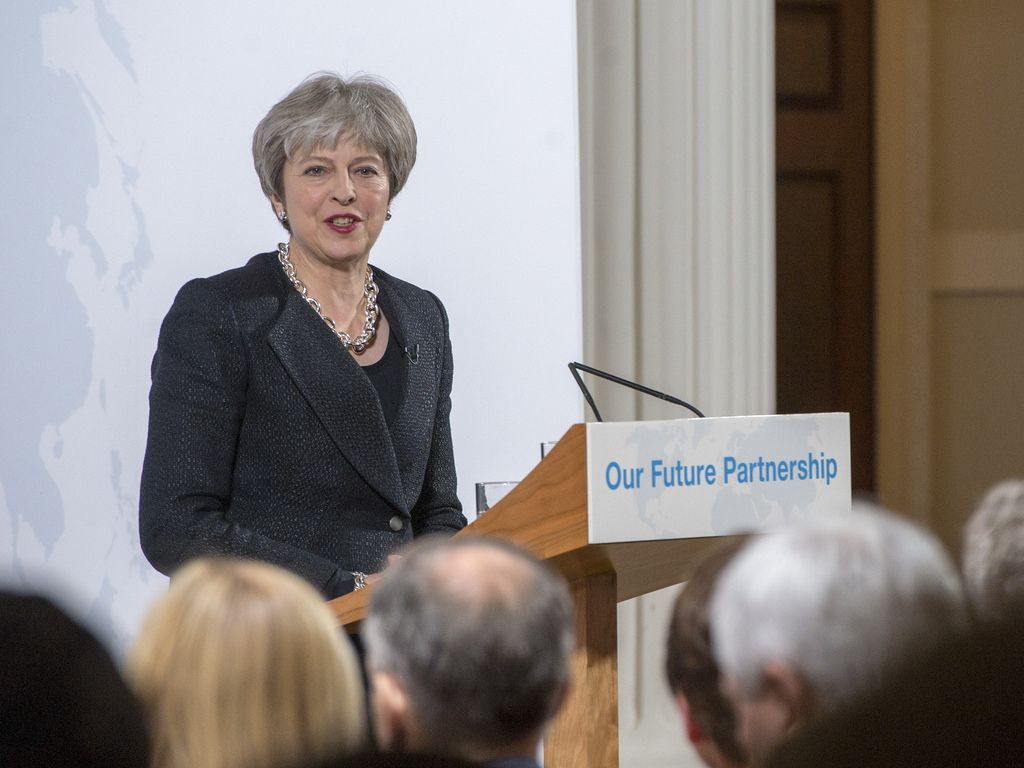Cautious Welcome to Theresa May's 'Realistic' Road to Brexit Speech
- Spot market exchange rate quotes:
- Pound-to-Euro exchange rate: 1 GBP = 1.1205
- Pound-to-Dollar exchange rate: 1 GBP = 1.3807

Image © Crown Copyright
The British Pound edged lower against the Euro and treaded water against other major currencies as UK Prime Minister Theresa May delivered a detailed speech which sought to set out the UK's position on upcoming Brexit negotiations.
The speech lasted nearly an hour and provided more detail than many commentators had been expecting, covering aspects such as the future of specific industries and sectors while warning both sides in the Brexit debate that compromises would have to be made.
The speech - which can be read here - appears to have gone some way in uniting remain and Brexit supporting members of her own party suggesting the speech will ease concerns surrounding the longevity of her leadership.
The reaction by currency markets suggests the speech did not deliver any groundbreaking information and traders are likely to remain nervous over whether a transitional deal will be struck at the European summit on March 23. The striking of such a deal is key to Sterling's outlook, with failure to deliver on March 23 likely to trigger a fresh bout of selling.
The Pound-to-Euro exchange rate has steadily traded lower through the duration of the speech but recovered losses by the close - the exchange rate was about 1.12 at the start of the speech, fell to 1.1186, and ended the week back above 1.12.
To be fair, we note that this move looks to be a Euro story as we observe that the EUR/USD exchange rate has advanced by almost exactly as much as the EUR/GBP has. The GBP/USD exchange rate is as flat as a pancake and Sterling looks to be entering the weekend in neutral.
This is not a major currency reaction, and what will likely be key for the currency from here is the kind of reaction the European Union delivers.
The initial response from the EU's chief negotiator Michel Barnier is positive: "I welcome PM Theresa May's speech. Clarity about UK leaving Single Market and Customs Union & recognition of trade-offs will inform EUCO guidelines regarding a future FTA."
The UK Offers Substance
As mentioned, the speech contained more detail on the UK's desires than previous speeches.
Of note, on the treacherous issue of the Irish border - that tripped Sterling in mid-week trade - the UK proposes a "customs partnership" with the EU which amounts to a kind of customs arrangement.
May proposes "a trusted trader scheme, for businesses either side of the Irish border," - i.e. customs will not bother with checking small businesses in order to ensure no hard border is erected.
On wider issues of trade, May suggests the UK and EU regulatory standards "will remain substantially similar in the future" which appears to be a concession to those members of her cabinet who want to see as close as possible regulation between the UK and EU.
"May set out the softest possible form of Brexit that still met her red lines of leaving the Single Market and Customs Union – including alignment of regulatory standards for goods, in order to ensure trade remains 'as frictionless as possible'," says Paul Hollingsworth, Senior UK Economist with Capital Economics.
The initial reaction of May's Northern Irish partners - the DUP - was positive with leader of the party's parliamentary party Nigel Dodds saying "the Prime Minister sets out the sensible approach of how no hard border can work. As she (and we) have been saying all along. It's in the papers the Government produced last August."
This confirms the Conservatives and DUP remain aligned which suggests the ruling parliamentary coalition is not in any imminent threat. But what we do know is the EU has already said these proposals remain unconvincing, so it's hard to see how this has broken any deadlock.
May also said there are some "hard facts for EU to face" in that "we recognise there are tensions in both sides positions. But we must recognise that it is a negotiation, and both sides cannot get everything they want."
May said an off-the-shelf model - i.e. a Canada, or Norway style trading relationship -n cannot be appropriate.
"This is a negotiation - neither of us can have what we want," says May, "we need to look beyond precedents".
May says it is in the EU's interest, as well as, the UK's to negotiate a tailor-made deal as from "day one we will have the same laws and rules."
And, "every trade arrangement is cherry picking" May says as she takes on one of the European Union's favourite lines of attack on May's negotiating position.
"What would be cherry picking would be a deal where our rights and obligations were not held in a fair balance," adds May.
The Prime Minister also points out that all of the European Union's neighbours have varying access to single market.
The UK believes no tariffs or quotas should be introduced and trade in goods should be “as frictionless as possible”.
May confirms she wants mutual recognition of standards for goods in order to help oil trade.
The Prime it is also looking to keep the UK involved in many of the EU's agencies as this is a pragmatic and common sense approach and the UK will be willing to pay for and obey rules of some EU agencies, like in pharmaceuticals.
Advertisement
Get up to 5% more foreign exchange by using a specialist provider to get closer to the real market rate and avoid the gaping spreads charged by your bank when providing currency. Learn more here.




